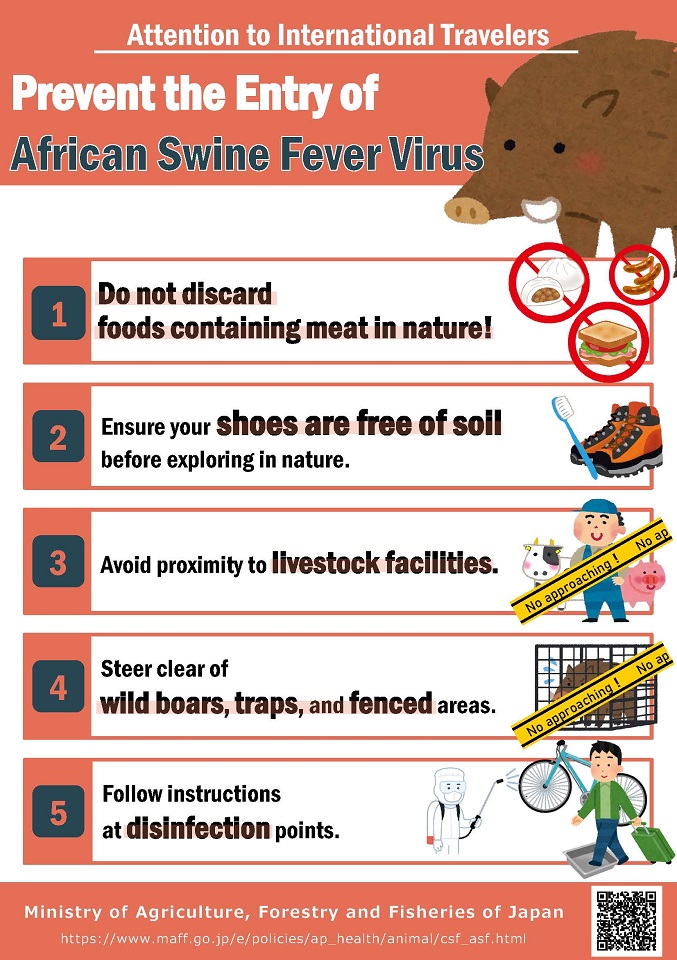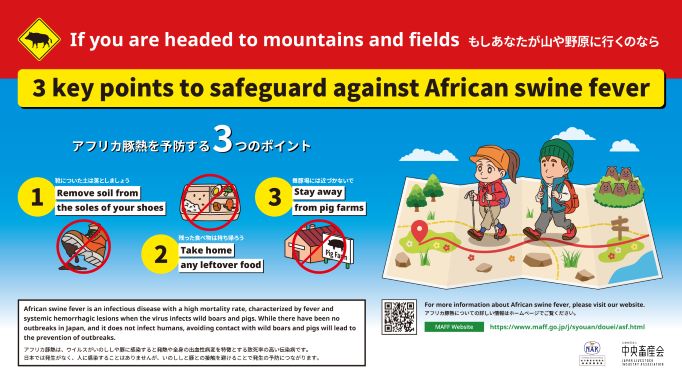Information and Instructions in Regard to Classical Swine Fever (CSF) and African Swine Fever (ASF)

Attention to International Travelers
While there have been no outbreaks in Japan, ASF virus has been spreading in wild boar in neighboring countries such as China and South Korea. To avoid bringing in ASF, the Ministry of Agriculture, Forestry and Fisheries (MAFF) asks everyone to cooperate in the following efforts.- Do not discard foods containing meat in nature!
- Ensure your shoes are free of soil before exploring in nature.
- Avoid proximity to livestock facilities.
- Steer clear of wild boars, traps, and fenced areas.
- Follow instructions at disinfection points.


English(PDF : 758KB)、한국어(PDF : 816KB)
Information about Classical Swine Fever (CSF)
- CSF is a disease of pigs and wild boars and cannot be transmitted from pigs to humans.
- There are no reports worldwide of swine fever having been transmitted to humans from consuming pork meat.
- Pork meat affected by swine fever never appears on the market.
Information about Classical Swine Fever (CSF)
- CSF is a disease of pigs and wild boars and cannot be transmitted from pigs to humans.
- There are no reports worldwide of swine fever having been transmitted to humans from consuming pork meat.
- Pork meat affected by swine fever never appears on the market.
Information about African Swine Fever (ASF)
- ASF is also a disease of pigs and wild boars and cannot be transmitted from pigs to humans.
- ASF and CSF are different diseases caused by different viruses.
- Japan is an ASF-free country, but ASF has spread to Asia.
- The Japanese Animal Quarantine Service has strengthened animal quarantine inspections to prevent the incursion of the ASF virus into Japan.
If you are headed to mountains and fields (hiking, camping, etc.)
CSF and ASF, which affect pigs and wild boars, are different diseases. However,the basic measures to control those infections in wild boars are the same. To avoid spreading of CSF and bringing in ASF, the Ministry of Agriculture, Forestry and Fisheries (MAFF) asks everyone to cooperate in the following efforts.- Remove soil from the soles of your shoes.
- Take home any leftover food.
- Stay away from pig farms.
- If you find a dead wild boar, do not touch it but contact the local authorities.


English(PDF : 1,909KB), 中文(简体字)(PDF : 1,854KB), 中文(繁体字)(PDF : 1,925KB), 한국어(PDF : 1,912KB), Tiếng việt(PDF : 1,950KB), Tagalog(PDF : 2,084KB)
Q&A on CSF
CSF is a disease of pigs and wild boars and does not infect people. Nor will such infected pork meat appear on the market.Consuming the meat or guts of a CSF-infected pig will not affect the human body.-
Q1 What kind of disease is CSF? A1 CSF is a disease of pigs and wild boars that are infected with the CSF virus. The virus is characterized by its strong transmissibility and high fatality rate and is designated as a domestic animal infectious disease under the Act on the Prevention of Infectious Diseases in Livestock. For this reason, epidemic prevention measures are to be taken on domestic pigs on farms where the disease has been detected. Q2 Are CSF and ASF the same disease? A2 They are different diseases caused by different viruses, but have similar symptoms. The CSF virus (CSFV) that causes CSF is classified in the Flaviviridae family, genus Pestivirus, while the ASF virus (ASFV) that causes ASF is classified in the Asfarviridae family, genus Asfivirus. The ASFV also does not infect people. Q3 Has there been a CSF outbreak in Japan? A3 In 1887, the first outbreak of CSF was detected in Japan. The development of a live vaccine in 1969 led to a sharp decline in outbreaks. There had been no outbreaks of CSF from 1992 till 2018, it recurred in Gifu prefecture. Q4 Does the CSF virus infect people? A4 CSF is a disease of pigs and wild boars. It does not infect people. Q5 Is there CSF-infected pork on the market? A5 Under the Slaughterhouse Act, all pigs are inspected for abnormalities and diseases by slaughterhouse meat inspectors (veterinarians) from the municipality, and only those that pass the inspection are distributed in the market. Meat and guts identified as CSFV-infected at the slaughterhouse will fail the test and will not appear on the market. Q6 What measures have been taken since the outbreak in September 2018? A6 Since the outbreak in September 2018, MAFF has rolled out various measures, including thorough compliance with the biosecurity standards , measures for domestic pigs to promote early shipment, support for the installation of protective fences around the farms, as well as measures against wild boars, such as enhanced hunting/capturing and implementation of the oral vaccination. Q7 Why has MAFF decided to roll out a CSF vaccination? A7 Control measures for CSF are based on early detection and culling of infected pigs. The CSF vaccine, if properly administered, can protect the animals from the disease, but haphazard and uncontrolled vaccination can hinder detection of infected pigs. For this reason, preventive vaccination is not carried out in principle.
However, CSF infection is spreading among wild boars. Thus, MAFF has decided to roll out CSF vaccination for domestic pigs in high-risk areas where it is difficult to prevent the infection of domestic pigs even by improving compliance with biosecurity standards.Q8 What is the CSF vaccine used? A8 The vaccine (hereafter the CSF vaccine) was approved by the minister of MAFF under the Pharmaceutical Affairs Law (Act No. 145 of 1960). The national government has a stockpile of them. Efficacy and safety are proven. Q9 Has the CSF vaccine been used in Japan? A9 For 37 years from 1969 to 2006, this vaccine was used on most pigs in Japan. Q10 Does eating meat from pigs that have received the current CSF vaccine affect human health? A10 Eating meat from pigs that have received the CSF vaccine will not affect human health. See below for details. Q11 Have there been any reports that eating meat of CSF-vaccinated pigs had any impact on human health? A11 In accordance with the above laws, MAFF has collected safety and other information on approved drugs in actual practice after being sold. There have been no reports that eating meat from the CSF-vaccinated pigs had an impact on human health. Q12 What ingredients does the CSF vaccine contain? A12 It contains CSF virus that is made less virulent so as not to cause CSF in pigs, in addition to additives. Q13 Do the additives in the CSF vaccine have any impact on human health? A13 The additives contained in the CSF vaccine are (1) food-derived substances or substances that are commonly contained in food (sodium chloride, purified water, lactose) and (2) substances used as food additives in accordance with the Food Sanitation Act (polyvinylpyrrolidone, sodium hydrogen phosphate, disodium phosphate), so the amount of additives contained in the vaccine will not harm human health. Q14 Do the CSF vaccine ingredients remain in pork? A14 Healthy pigs vaccinated with the CSF vaccine develop immunity to CSF in the body. When immunity is achieved, as in human immunization, the CSF virus contained in the vaccine disappears from the body. For this reason, the CSF virus contained in the vaccine is unlikely to remain in pork. Even if the ingredients of the vaccine (see Q11 and 12) remain, there will be no impact on human health.
Contact
Animal Health Division
Telephone: 4581
Direct Line: 03-3502-5994




